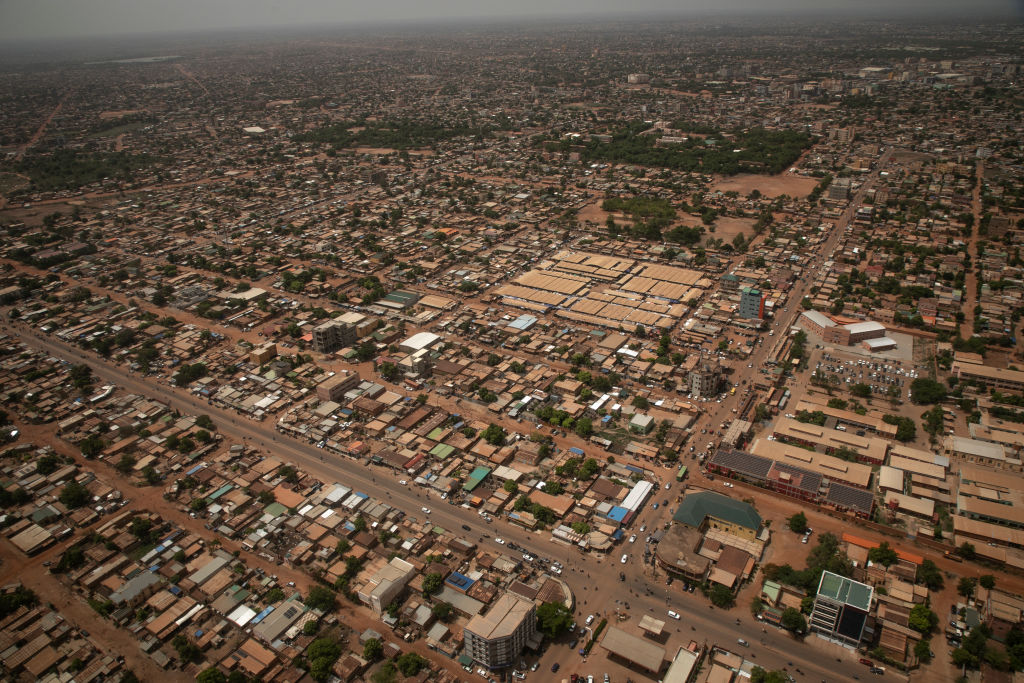Relentless Russian-backed propaganda portrays Burkina Faso as opening new factories and paying off its foreign debt. The reality is something entirely different: The majority of the country is beyond the government’s control as terrorists attempt to encircle the capital, Ouagadougou.
Analysts estimate that extremists from Jama’at Nusrat al-Islam wal-Muslimin (JNIM) and Islamic State Sahel Province (ISSP) control as much as 60% of Burkina Faso’s territory. The groups have expanded their grasp in the years following the 2022 rise of the junta headed by Capt. Ibrahim Traoré.
After the coup that brought Traoré to power, Burkina Faso expelled France’s counterterrorism Operation Barkhane and turned to Russia’s Wagner Group mercenaries for support against the two terrorist groups.
The terrorists’ territorial expansion coincided with Wagner’s brutality and widespread violence by the country’s Volunteers for the Defense of the Fatherland militias. Both groups attacked civilians suspected of cooperating with JNIM and ISSP, which operate across Burkina Faso, Mali and Niger.
As JNIM blocks fuel supplies in neighboring Mali, observers question whether JNIM and ISSP have the capacity to conquer Ouagadougou and take over Burkina Faso.
Writing for the Institute for Strategic Studies, analysts Djiby Sow and Hassan Koné say that neither JNIM nor ISSP have driven government forces from rural communities such as Djibo, and both lack the capacity to take over larger communities or the capital.
JNIM blockaded and raided Djibo near the Malian border for five years before taking control of it in May. Soum, the northern province where Djibo is located, has been a JNIM stronghold since 2015.
“They lack the firepower and logistical capabilities to sustain a prolonged siege and occupation of a major city,” Sow and Koné wrote. “Their strength lies in mobility and local knowledge rather than the capacity to occupy and govern territory for long periods.”
In addition to that, public sentiment in Ouagadougou and other Sahelian capitals remains hostile toward terror groups because their actions result in violence, instability and national suffering, according to Sow and Koné.
More likely, analysts say, JNIM and ISSP will use that violence, instability and suffering to isolate Ouagadougou.
Analyst Will Brown, a senior policy fellow for Africa at the European Council on Foreign Relations, foresees “a Mogadishu-style scenario, where the government is increasingly confined to an embattled capital.”
“The government forces appear to be on the back foot and are struggling to control much territory outside the capital despite what all the deafening propaganda says,” Brown told The Africa Report. “Our contacts tell us there is low morale in the military, and the jihadist forces are armed to the teeth with looted equipment.”
From its post in Ouagadougou, the junta relies on the Wagner Group’s successor, Africa Corps, to protect Traoré and generate propaganda promoting the regime. All the while, security in Burkina Faso continues to degenerate.
“Russia’s approach is destabilization and that’s what they’ve achieved,” analyst Bram Posthumus told The African Report. “The juntas are cheap, the propaganda is cheap, the troll farms are cheap, the limited security assistance is cheap and even the talk of ‘sovereignty’ is cheap. It’s all about getting maximum disruption for minimal cost.”

